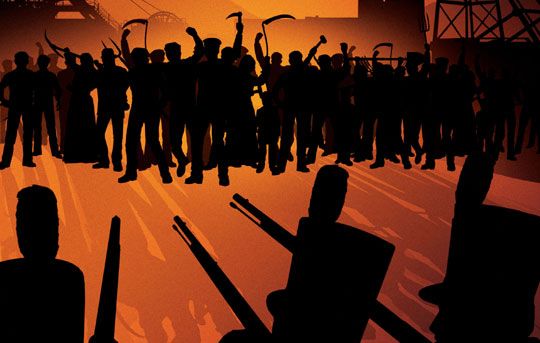New Theatre, Cardiff
Sion Ifan, Hedydd Dylan, Gwawr Loader,
Crisian Emanuel, Simon Nehan.
Dir. Tim Baker.
From the brightly lit foyer to every seat in the stalls, a buzz of expectation hovered over the theatre-goers who turned up to see Rape of the Fair Country which opened at the New Theatre, Cardiff this month. Rarely have midweek performances drawn audiences of this size and it was clear that expectations were running high for this re-run of Manon Eames’ adaptation of Alexander Cordell’s novel.
Mine certainly were. I’ve been a fan of Cordell’s work for many years and feel that I know the Mortymer family like my own. Rape of the Fair Country is the first in a trilogy of books which charts the lives and drama of a family caught up in the turbulent period of the Welsh Industrial Revolution. Cordell captures the passion and vitality of people experiencing the hardship of life in the Welsh valleys; the pages of his novel describe the harsh realities of survival but are leavened with humour and passages of heartbreakingly beautiful description of a rural area in the throes of industrial desecration. Historically, Cordell’s book is hugely significant. It brought the world’s attention to an overlooked period in Welsh history and it helped achieve World Heritage status for Blaenafon.
Directed by Tim Baker, the cast make maximum use of the minimalist set which conjures the claustrophobic living conditions of life inside and outside of the iron foundries. In particular, a chapel outing on barges along the canal to Newport works especially well; the attack by Irish workmen is funny and the community hymn singing delightfully executed. When Iestyn and his father, played by Simon Nehan, have a man-to-man conversation on the facts of life on young Iestyn’s first day at work, we are treated to more humour. Charlotte Grey as Polly Morgan adds a darker humour. Her ‘blessed are the fornicators’ speech is an ominous foreshadowing of her life to come.
There is no doubt that the cast expend their full energy in this mammoth production. Hedydd Dylan gives a superb performance as the spirited Morfydd; her diatribe on religion to the bossy Mrs Phillips is well delivered. Sion Ifan struggles to portray the eight year old Iestyn Mortymer, lapsing at times into caricature, but he acquits himself well when he comes of age later in the play. Christian Patterson, as Tomos Traherne, gives a good portrayal of the minister of peace frustrated by the inevitability of violence in improving the workers’ lot. The clever setting of narrative passages to popular hymn tunes works well and the cast voices and harmonies are beautiful rendered.
From the onset, it’s clear that Eames has bitten off a massive undertaking. One of the issues any writer must tackle in an adaptation is knowing what to include and what to safely exclude. The trouble here is that the novel is packed with events and, rather than extract key highlights, Eames tries to cram everything in. And it’s too much to do the work justice. The performance feels like a history lesson at high speed and woe betide any member of the audience who doesn’t know their Welsh history. After a long ninety minutes, the interval came as a welcome relief for those trying to piece together events on stage. Unfortunately, the remaining hour squeezed in flying references to Scotch cattle and their mysterious symbols, the demands of benefit clubs, unions and landowners and a militant attack by Chartists which was barely explained. All of which left any uninitiated audience members baffled.
Don’t get me wrong, I love my Welsh history, but even I only just managed to keep up with where Eames was leading. It all felt like there was too much ‘telling’; as though I’d turned up at a history lecture and needed a fast recap on last week’s notes. And that’s fine if you already know what’s going on, but if you are hoping for some kind of introduction to Welsh history, I’m afraid you are going to feel excluded by Eames’s adaptation, and this seemed to cater only for those already initiated.
Eames’ rendition of the novel seems like a Greek tragedy in which one crisis after another sweeps the story to tragic climax. A chorus of village neighbours attempts to keep the audience up to speed with the story, which is told through a welcome variation of song and narrative monologue. In fact, Tim Baker’s production plays very much like a Greek performance. It’s melodramatic. Most of the lines sound like declarations delivered at full volume. The six points of the ‘People’s Charter’ are belted out to the back of the theatre like a proclamation. Even the descriptive monologues narrated by Iestyn are jettisoned to the back seats without any sense of emotion. These monologues, lifted straight from the original text, simply don’t work on the stage; the beautiful descriptive passages are too long and fragile to withstand the force of this sort of delivery. And I think that’s why this adaptation fails. In performance, the onslaught of tragedy is unrelenting, like a runaway steamroller. In the novel, there is respite in delicate description and gentle comic interludes; a juxtaposition which adds poignancy to the developing tragedy.
As a piece of community theatre aimed at boosting Welsh pride, this production would fit the bill. But the script felt too expositional, the delivery too loud and hectoring. I became numb to the tragedy; I came not to care about what happened to the characters and just wanted the two and half hours to be over. Despite the rousing finale, it was a relief when the curtain came down on what felt like a Welsh version of Les Miserables but without the songs to redeem it.












